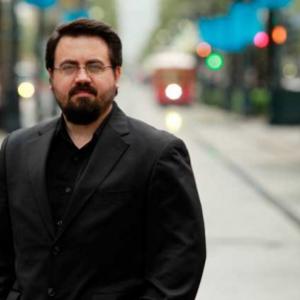
Ken Chitwood (@kchitwood) is a religion scholar and newswriter based between Germany and Arizona. He is a senior research fellow with the Muslim Philanthropy Initiative (IUPUI) and conducts research on Islam and Muslim communities in Latin America and the Caribbean, global religion, and ethnographic methods in an age of diversity and difference. Ken is editor of ReligionLink, a premier resource for journalists reporting on religion and serves as president of the Religion News Association (RNA). A Lutheran, Ken has been described as a “theologian without borders," interested in the contextualization of traditions across religious boundaries, physical borders, and cultural barriers.
Posts By This Author
Observing Ramadan After the Hurricane

A driver drives a car along the street after Puerto Rico Electric Power Authority (PREPA), the island's power company, said on Wednesday that a major power line failure in southern PuertoRico cut electricity to almost all customers, in San Juan, Puerto Rico April 18, 2018. REUTERS/Gabriel Lopez Albarran
Following up with Juan after a year of struggle in the wake of the storm, he said, “Puerto Ricans are proud, committed, strong, and ‘pa’lante’ (moving forward). And that includes Muslims.” After the destruction of Hurricane Maria, the month of Ramadan, held special meaning for him. It held hope for “renewal.”
What Does God Require of Us Amid Rising Islamophobia?
Seeing the parallels between Micah’s time of unease and ours, it would behoove us to lean in for a listen when Micah writes, “He has shown you, O mortal, what is good. What does God require of you? That you act justly and love mercy and to walk humbly with your God.” (Micah 6:8)
The 2 Questions Neither Convention Is Asking
While questions may not serve as effective campaign platforms, they can spark a conversation and reveal what our missions, values, and visions truly are. Americans from all backgrounds and political parties should take the time to ask: What kind of America are we making, and why are we united in this together?
A Crucial Ingredient in Justice Work: Rest

Image via siribao/Shutterstock.com
Justice work is good work. It is a high calling. It deserves great effort and exertion. But in today’s world, if our work in the realms of social justice mimics the exhausting routine of the fiercely competitive struggle for wealth and power, we would do well to take a moment to consider the biblical rhythm of Sabbath.
The esteemed rabbi Abraham Joshua Heschel wrote in The Sabbath that the holy day serves as a “sanctuary in time.” The invitation of the Sabbath is a summons to dwell in the eternality of time, he wrote, to turn from “the results of creation to the mystery of creation, from the world of creation to the creation of the world.”
A 'Radical' Response to Islamophobia

connel / Shutterstock
“IT ALL STARTED with pig races,” said Dawud, the groundskeeper at the Muslim American Society’s mosque in Katy, Texas. Soon after the group purchased the land, their neighbor, Craig Baker, began hosting well-publicized hog heats for some 300 spectators every Friday evening. Baker’s timing was deliberate, chosen to correspond precisely with the jummah prayers—the holiest time of the week for Muslims—and to offend their dietary restrictions, which forbid pork.
That was back in 2006. Today, things are more peaceful. Follow the narrow road that curves amid loblolly pines and sage grass, and you’ll see sun gleaming off the black roof of the now-finished mosque. “It was a matter of disagreement, but it’s over now,” said Dawud last fall. “I am happy it’s done and we are at peace.”
But while the pig races have ended, signs of hostility linger: Two blue and white billboards bearing a Christian cross and a Star of David are posted just off the edge of the mosque’s property. The intended message isn’t subtle: “Muslims, you don’t belong here.”
Though many Americans actually had favorable views of Islam after 9/11, a recent study by Georgetown University’s Bridge Initiative found that those views became increasingly negative throughout the Iraq war.
‘Radical Muslims’ Clothing Line Attempts to Shatter Stereotypes
Radical Muslims. The phrase elicits images of ISIS militants and terror in the desert, perhaps grainy YouTube videos, Kalashnikovs, and raised fists.
What about a man in an ankle-length garment and cotton headscarf carving the air with his skateboard?
Is that a radical Muslim?
Along with shirts bearing the “Radical Muslims” image and a Nike-like swoosh saying “Just Dua It” (dua being nonobligatory Muslim prayer, or supplications), Boston-based Munir Hassan has created an entire line of stereotype-shattering clothing for American Muslims.
In an explicit attempt to flip the script on popular images of Muslims and Islamic symbols, Hassan’s own Sidikii Clothing Co. merges cultures in fashion-forward, Muslim inspired designs.
“I’m Muslim, I’m American. I was born both,” said Hassan.
“I wanted to design clothing that showcased different pieces of my culture inclusively.”
Why Do Westerners Join ISIS?
Whether ISIS is "Islamic," or a "state," it is definitely terrifying. As it terrorizes the Levant — killing Muslims, Christians, Jews, Yazidis, and other religious/cultural minorities in Syria and Iraq — and takes the lives of Western journalists, it strikes fear in the hearts of many.
Swirling around the alarming analysis are the rumors and realities of individuals from Europe and the U.S. joining the ranks of ISIS and fighting for their "cause."
The intelligence organization Soufan Group recently released a report stating that fighters from at least 81 countries have traveled to Syria since its three-year conflict began. Hundreds of recruits come from nations like France, Germany, the UK, and the U.S.
Of all the fearful intimations of this conflict, this feature seems to be the most frightening to many in the West. Could it be that my neighbor is a secret jihadi? Are redheads (a "pure" European stock) more prone to terrorism? Are mosques their hideouts? Regardless of the judiciousness of these questions, underlying them all is the question "why?" Why would someone leave the West to fight for ISIS in Syria and Iraq?
According to the Soufan report, those that leave for the Middle East to fight are typically 18-29 year-old men (some as young as 15) and some Western women who join with their spouses, or come alone to become "jihadi brides." These men and women are Islamic, often second or third generation immigrants, though very few have prior connections with Syria.
Why do they join? Is it religious devotion? Psychological imbalance? Tendency toward radical movements and anarchy? All of these motivations may play a part, but my argument is that these men and women who leave their Western homes for the dunes of terror are lonely.
These Western jihadis are isolated — that is why they join ISIS.
The Ice Bucket Competitor: Can the Quran Challenge Go Viral?
Move over Ice Bucket Challenge. Muslims have a new take on the viral social media phenomenon: the Quran Challenge.
The new campaign seeks to raise awareness and funds for Muslim “da’wah” — a call to propagate the faith — by reciting verses from the Quran on various online platforms.
Issam Bayan, a 26-year-old student and professional Islamic singer, came up with the idea as a way to awaken Muslim piety, just as the Ice Bucket Challenge raised awareness and well over $30 million for ALS, or amyotrophic lateral sclerosis, a degenerative condition also known as Lou Gehrig’s disease..
While the #QuranChallenge has no specific cause, Bayan, who lives in Germany, said he wanted to make it available to all Muslims regardless of their financial ability to make a contribution. In an email interview, he said the benefits for this challenge are the rewards that a Muslim receives for reciting the Quran.
Bayan posted his first video to Facebook and YouTube on August 30 with the words, “Let’s collect the rewards and challenge your friends by reciting some verses of the Holy Quran.”
Skeptics Wonder if Ex-Clergy Should Lead Atheist Movements
By definition, skeptics are pretty skeptical. They question what they see as unfounded claims or dubious motivations, whatever the source. Now, they are questioning some of their own leaders.
With the success of organizations such as The Clergy Project — an online community seeking to provide a safe place for clergy members who reject supernatural beliefs — numerous former ministers are joining the ranks of the publicly nontheistic.
Some have risen to the leadership of prominent atheist organizations. Last week, Teresa MacBain was dismissed from her high-profile position at Harvard University’s Humanist Community after it was revealed she inflated her resume. The former United Methodist pastor claimed a degree from Duke Divinity School she did not have.
“Our society needs so much and thriving secular communities could make significant contributions, ” wrote Donald Wright, author and organizer of the Day of Solidarity for Black Non-Believers, on Freethought Blogs. But, he added, “My unsolicited advice is to be skeptical of this new wave of leadership.”





